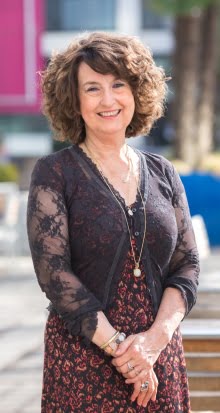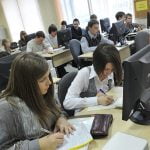Simone talks about bridging research with education, innovative learning techniques … and Harry Potter-esque titles.
Leading educator and physician Professor Simone Buitendijk joined the College last month as Vice Provost (Education), having moved from the Netherlands where she performed a similar role at Leiden University as Vice-Rector Magnificus, with responsibility for education and student affairs.
When asked if she misses the ‘Magnificus’ title from the 16thCentury institution, Simone bursts into an infectious laugh that’s a feature throughout our hour-long interview.
“Friends in the US and the UK always used to have a lot of fun with that title; it has such a Harry Potter ring to it doesn’t it? Like the Expelliarmus Spell or something. But having ‘Imperial College London’ embossed on my business card will more than make up for it though,” she says.
Simone’s obvious warmth, sense of humour and empathy with students will no doubt stand her in good stead for her role in leading Imperial’s vision for education and student experience.
In addition, as a globally recognised researcher in public health, Simone is well placed to help deliver the College’s Strategy 2015-20, which reaffirms Imperial’s mission to achieve enduring excellence in research and education in science, engineering, medicine and business for the benefit of society.
Building bridges
But how best to bridge these sometimes disparate worlds of teaching and research?
“That’s the million dollar question that all research-intensive universities are trying to answer and I’m afraid, as a group, we’re not doing a good enough job. There’s still too much focus on research as something separate. The bridge isn’t built well enough.
“We can do a lot better in ensuring, firstly students actually understand that they are in a research intensive university but also in getting them engaged in research. We need to look for ways of drawings students into doing research from day one and carrying that through their university careers – it might not be on critical, Nobel Prize potential research but there are ways of letting students practice with actual research and with databases for example.”
Simone stresses that this is not just for the benefit of the students and the institution – but for society at large.
“It’s so important that every person who graduates from Imperial understands evidence-based thinking, and why research is so important. We often forget that we’re training the next generation of government and industry leaders and decision-makers. If you observe some of the things that governments are doing in HE at the moment, it’s totally not evidence based, and that really irritates me.”
With Simone’s wealth of experience in medical education and HE teaching more broadly, we ask if she now has a clear idea of what good teaching looks like – and how one defines good teaching. But she plays this down and says there are numerous types of great teaching and so many ways of looking at it. She does though emphasise the need for a positive experience on both sides – a partnership with a genuine connection. That can come through traditional teaching methods, but also through online and blended learning.
“Innovation and online learning is one of my themes, but it should never be a goal in and of itself – it’s a tool. You need to make sure it enhances the connection and there may well be instances where it does that just, for example, if the physical teacher is rushed or not engaged or there are students at the back of the class on their phones. In that case an online community or blended learning approach might be better, using classroom technology with handheld devices, where the teacher has a dashboard and can immediately see if the students understand the question, and students can engage and post follow-up questions and answers instead of raising their hand.”
At Leiden, Simone pioneered Massive Open Online Courses (MOOCS), and what was surprising, she says, was how much some staff enjoyed the experience and how well know they became around the world. Some of the ‘star academics’ gained such a following online, they would hold meetings with learners in cafés in a foreign city they happened to be visiting. Some researchers even used the online communities for gathering important survey data for their research, as one academic specialising in terrorism studies did.
Challenges ahead
The challenges inherent at Imperial, as an elite university trying to maintain research excellence and improve teaching, was something that actually appealed to Simone about the role. Indeed, she doesn’t shy away from one of the more specific recent challenges, which is therecent dip in National Student Satisfaction (NSS) scores, after several years of steady improvement. She says that whatever the root causes of the drop, the first step is to listen more to students and try to better understand the student experience across the board.
“Many students in their qualitative reviews complained that they are not being seen and heard. I think that really is an issue and it gets reflected in many measures. It’s important for people in positions of responsibility like me to listen empathically to both staff and students and find out where things aren’t going so well and how we can improve”
As part of its response to this year’s NSS results, the College will be working with Imperial College Union and with the Imperial-wide community to review the results in detail and to develop a joint action plan to address problem areas identified. The progress of this will be overseen by Imperial’s Provost’s Board, one of its senior management bodies. The College also plans to introduce new teaching initiatives with a focus on student feedback, research experience and entrepreneurial opportunities, and has already committed funds to develop these.
Indeed, Simone points to the Enterprise Lab, an exciting new facility in the basement of the Library for students who have entrepreneurial aspirations or just want to enhance their workplace skillset. Opening in October it will allow groups of students to discuss projects, practice their pitching and also get advice from enterprise experts.
“I’d actually like to expand the definition of entrepreneurial; at the moment it’s equated very much with business orientation and there’s nothing wrong with that, but we should offer opportunities for students who want to change the world in different ways – working with NGOs or improving healthcare delivery around the world for example,” says Simone, who notes how many social enterprises have come out of Imperial’s Althea programme for enterprising women.
Earlier in the year, Simone herself went on an enterprising missionto South Africa and Mozambique alongside colleagues at Leiden – to strengthen the institution’s existing links with universities and knowledge centres there and also explore new opportunities for collaboration and delivering online learning through MOOCS.
Closer to home, Simone is slowly settling into London life – but admits to feeling a little intimidated by the spread of the capital “You can walk across Amsterdam in less than an hour – here in that time you only scratch the surface.” Still, with the unseasonably warm mid-September weather she’s been walking from her home in Earl’s Court into the College most days.
“I’m assured by my colleagues it almost certainly won’t last, so I’m making the most of it while I can!”
Quick fire questions
- 1. How do you relax outside of academia
Having been a serious runner in the past, I’ve transitioned to long walks in recent years. I also meditate when I can. Mindfulness is a great tool for people in this hectic day and age; it really forces you to look at yourself, to slow down every now and then and get out of the mindset that the higher your pace the more effective you are – it’s not always true!
- 2. Have you taken anything with you from Netherlands to remind you of home?
Appropriately enough, I actually have some pictures of tulips that I captured at the Keukenhof, a park in the Netherlands, which is just so beautiful in spring. In my office I have pictures of students from Leiden who sat on the faculty boards. There’s also a contact sheet of portraits of current female professors at Leiden – these were temporarily placed over the almost exclusively male historic portraits in the Academy Building at Leiden
.
- 3. What areas of London have you explored so far?
I really look forward to the weekends I have in London, as I return to the Netherlands every two weeks or so to see my children. I recently went with a friend to Hampstead Heath and stopped at a spot which just had the most amazing views overlooking the city. But there’s still just so much left to explore.
[Source:-Imperial College London]







